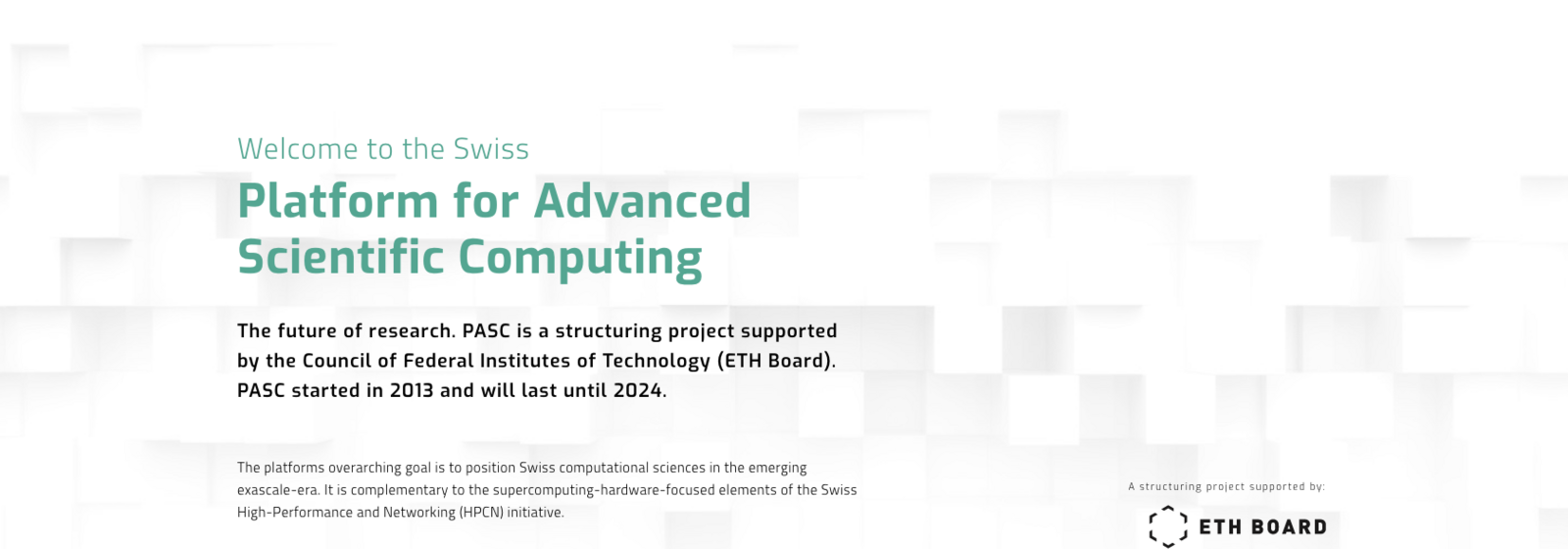July 1, 2021 - by CSCS
It's that time again: Since 2009, interdisciplinary projects have been initiated for the fourth time via the Platform for Advanced Scientific Computing (PASC) with the overarching goal of ensuring application readiness on the emerging pre-exascale and exascale hardware architectures.
For the new period 2021 to 2024 nineteen proposals were submitted, requesting a total of CHF 8.5 million. Fifteen of them were finally approved with a total budget of CHF 6.47 million. The requirements for the submitted projects were that they are high-performance computing software development projects that address the broad availability, the quality and performance of software on GPU-accelerated supercomputing platforms. The goal is to develop application software that focuses on important scientific problems and uses GPU-accelerated high-end supercomputing infrastructures to solve them.
The new allocation period in PASC starts on 1 July 2021. Thirteen projects will receive funding for the next three years, two for two years. The selected projects cover a broad range of scientific disciplines and rely on interdisciplinary collaboration between domain scientist, mathematicians, computer scientists, computational scientists and software developers. The projects will receive the funding from the Swiss High-Performance Computing and Networking (HPCN) initiative, which will be used to finance around 22 full-time positions for the entire duration of the projects. All projects must provide their own contributions for an equal amount. In addition, every project gets 36,000 node hours of computing time on "Piz Daint".
The funded projects are the following:
Astrophysics/Cosmology
- SPH-EXA2 – Smoothed Particle Hydrodynamics at Exascale, led by Florina Ciorba, Professor at the University of Basel.
- Next-Generation Radio Interferometry, led by Jean-Paul Kneib, Professor at EPF Lausanne.
Chemistry and Materials
- Ab Initio Molecular Dynamics at the Exa-Scale, led by Jürg Hutter, Professor at the University of Zurich.
- Machine learning for materials and molecules: toward the exascale, led by Michele Ceriotti, Professor at EPF Lausanne.
- Spectral properties of materials on accelerated architectures, led by Nicola Marzari, Professor at EPF Lausanne.
Computer Science and High-Performance Computing
- DaCeMI: Harnessing future hardware using Data-Centric ML Integration, led by Torsten Hoefler, Professor at ETH Zurich.
- ExaTrain: towards Exascale training for Machine Learning, led by Rolf Krause, Professor at the Università della Svizzera italiana.
Earth and Climate Sciences
- AQUA-D: Accelerated QuICC Application – Dynamo, led by Andrew Jackson, Professor at ETH Zurich.
- Bayesian Waveform Inversion, led by Andreas Fichtner, Professor at ETH Zurich.
- FraNetG: Fracture Network Growth, led by ETH-Professor Thomas Driesner and Rolf Krause, Professor at the Università della Svizzera italiana.
- GPU4GEO: Frontier GPU multi-physics solvers, led by Paul Tackley, Professor at ETH Zurich.
- HAMAM: HAM and ART Acceleration for Many‐Core Architectures, led by Dominik Brunner, Professor at Empa
- KILOS: Kilometer-scale nonhydrostatic global weather forecasting with IFS-FVM, led by Heini Wernli, Professor at ETH Zurich.
Life Sciences
- MitrAccel: accelerated simulation of mitral heart valve biomechanics, led by Dominik Obrist, Professor at the University of Bern.
Physics
- Efficient QCD+QED Simulations with openQ*D software, led by Marina Krstic Marinkovic, Professor at ETH Zurich.
About PASC: www.pasc-ch.org
